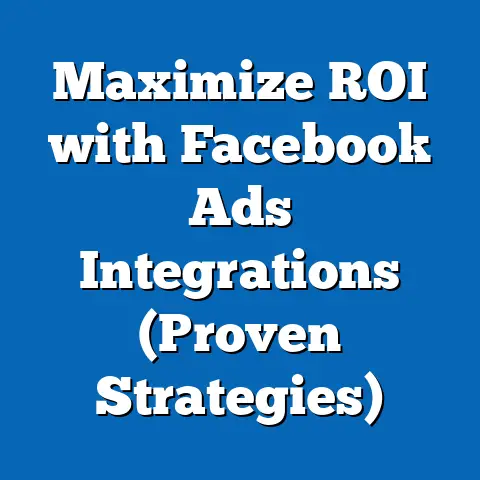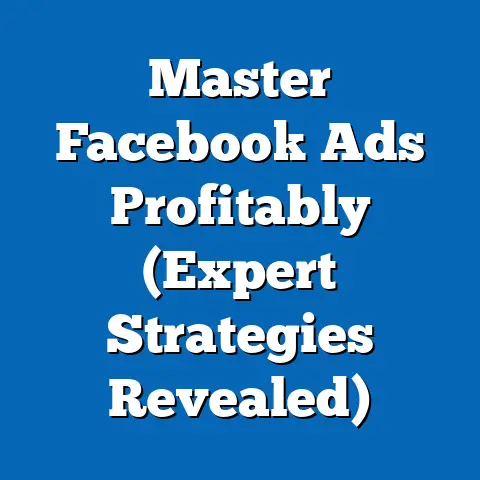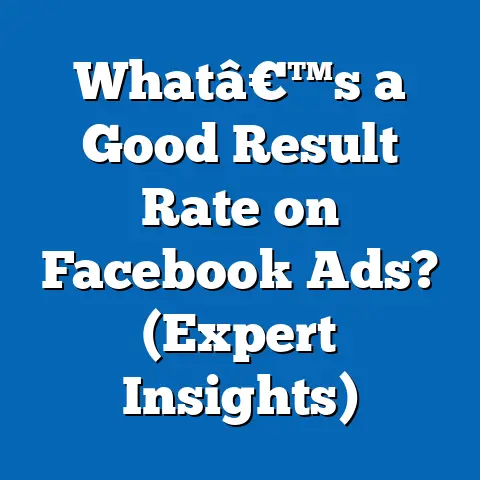Can Fraudulent Ads Hack Facebook Account? (Critical Insights)
Imagine a digital landscape where the allure of a great deal or an irresistible product masks a sinister scheme, much like a digital Trojan horse waiting to breach the walls of your online security.
This is the reality we face today, with fraudulent ads on social media platforms like Facebook becoming increasingly sophisticated and prevalent.
These aren’t just annoying pop-ups; they represent a serious threat to your personal information and the security of your online accounts.
In this article, I’ll delve into the alarming intersection of fraudulent advertising and cybersecurity, exploring how these deceptive ads can potentially compromise your Facebook account and what you can do to protect yourself.
Understanding Facebook Ads
Facebook ads are the lifeblood of the platform’s revenue, and a crucial tool for businesses of all sizes to reach their target audience.
They are essentially paid messages that businesses use to promote their products, services, or brand on Facebook.
These ads come in various formats, each designed to capture user attention in different ways.
- Image Ads: The simplest form, featuring a single image with accompanying text.
- Video Ads: More engaging, using video to tell a story or showcase a product.
- Carousel Ads: Allow businesses to display multiple images or videos in a single ad unit, each with its own headline, description, and link.
- Collection Ads: Designed for mobile shopping, these ads group products together, allowing users to browse and purchase directly from the ad.
- Lead Ads: Collect information from users directly within the Facebook platform, making it easy for businesses to generate leads.
The effectiveness and reach of Facebook ads are undeniable.
According to Statista, Facebook’s advertising revenue in 2023 reached over $134 billion, highlighting its dominance in the digital advertising space.
This massive revenue is a testament to the platform’s ability to connect businesses with a vast audience.
With billions of active users, Facebook offers unparalleled reach for advertisers, making it an essential tool for businesses looking to grow their brand and drive sales.
But what makes Facebook ads so effective?
It’s their sophisticated targeting capabilities.
Facebook collects a wealth of data on its users, including demographics, interests, behaviors, and connections.
This data is then used to create detailed user profiles, allowing advertisers to target their ads with laser-like precision.
For example, a local bakery could target Facebook users within a specific radius who have expressed interest in baking or desserts.
I remember working on a campaign for a small organic skincare brand.
By leveraging Facebook’s targeting options, we were able to reach a highly specific audience of women aged 25-45 who were interested in natural beauty products and eco-friendly living.
The result was a significant increase in website traffic and online sales.
However, this extensive data collection also raises concerns about privacy and the potential for misuse, which I’ll touch on later.
For now, it’s important to understand that Facebook ads are a powerful tool for businesses, but they also come with risks, especially when fraudulent actors enter the equation.
The Rise of Fraudulent Ads
Fraudulent ads are deceptive advertisements designed to trick users into taking actions that benefit the scammer, such as providing personal information, clicking on malicious links, or purchasing counterfeit products.
These ads can take many forms, but they often share common characteristics:
- Phishing Scams: Ads that mimic legitimate websites or brands to steal login credentials or financial information.
- Counterfeit Products: Ads that promote fake or imitation goods, often at deeply discounted prices.
- Investment Scams: Ads that promise unrealistic returns on investments, often targeting vulnerable individuals.
- Fake Contests or Giveaways: Ads that entice users to enter personal information in exchange for a chance to win a prize that doesn’t exist.
- Malware Distribution: Ads that lead to websites that download malicious software onto the user’s device.
The prevalence of fraudulent ads on Facebook is a growing concern.
While Facebook actively works to remove these ads, the sheer volume of content and the sophistication of scammers make it a constant battle.
According to a report by the Federal Trade Commission (FTC), consumers reported losing over $8.8 billion to fraud in 2022, with social media platforms like Facebook being a major source of these scams.
I’ve personally witnessed the impact of fraudulent ads on unsuspecting users.
A friend of mine clicked on an ad for a “discounted” designer handbag, only to receive a cheap knock-off.
While the financial loss was relatively small, the experience left her feeling violated and distrustful of online advertising.
Another, more serious, case involved a family member who fell victim to an investment scam promoted through a Facebook ad.
The ad promised high returns on a cryptocurrency investment, but it turned out to be a Ponzi scheme.
My family member lost a significant amount of money, and the emotional toll was even greater.
These real-world examples highlight the devastating consequences of fraudulent ads.
They not only cause financial harm but also erode trust in online platforms and businesses.
It’s crucial to be aware of the risks and take steps to protect yourself from these scams.
Mechanisms of Fraudulent Ads
Fraudsters are masters of deception, employing a range of tactics to create convincing ads that lure unsuspecting users into their traps.
Understanding these tactics is the first step in protecting yourself.
One common tactic is the use of social proof.
Fraudulent ads often feature fake testimonials or endorsements from seemingly satisfied customers.
These testimonials are designed to create a sense of trust and credibility, making the ad appear more legitimate.
Another tactic is the use of urgency.
Fraudulent ads often create a sense of urgency by claiming that the offer is only available for a limited time or that there is a limited quantity of the product.
This pressure tactic is designed to rush users into making a decision without fully considering the risks.
I’ve seen countless ads that claim “Limited time offer!” or “Only a few left in stock!” These phrases are designed to trigger a fear of missing out (FOMO) and encourage impulsive purchases.
Fraudulent ads are also often designed to mislead users into providing personal information.
For example, an ad might promise a free gift card or a chance to win a prize in exchange for completing a survey.
However, the survey is actually a phishing scam designed to collect your name, address, email, and other sensitive information.
These ads exploit human psychology by playing on our desires for discounts, freebies, and recognition.
They use carefully crafted language and imagery to create a sense of excitement and trust, making it difficult to distinguish them from legitimate ads.
The role of social engineering in these scams cannot be overstated.
Social engineering is the art of manipulating people into divulging confidential information or taking actions that compromise their security.
Fraudsters use social engineering techniques to exploit human vulnerabilities, such as trust, fear, and greed.
For example, a scammer might impersonate a customer service representative from a well-known company to gain your trust.
They might then ask you to provide your login credentials or financial information to “verify” your account.
I once received a phone call from someone claiming to be from my bank.
They said that my account had been compromised and that I needed to provide my account number and password to secure it.
Fortunately, I recognized the scam and hung up immediately.
But it was a chilling reminder of how easily we can be manipulated by skilled social engineers.
Can Fraudulent Ads Hack Facebook Accounts?
The question of whether fraudulent ads can directly “hack” your Facebook account is complex.
While a fraudulent ad itself cannot directly penetrate Facebook’s security systems and gain access to your account, it can serve as a gateway to various methods that can lead to your account being compromised.
One of the most common methods is phishing.
Fraudulent ads often link to phishing websites that mimic the Facebook login page or other trusted websites.
When you enter your login credentials on these fake websites, the scammers capture your username and password, giving them access to your account.
I’ve seen countless examples of phishing websites that look almost identical to the real Facebook login page.
They use the same logos, colors, and layout to create a convincing illusion.
It’s easy to be fooled, especially if you’re not paying close attention to the URL.
Another method is malware distribution.
Fraudulent ads can lead to websites that download malicious software onto your device.
This malware can then steal your login credentials, track your online activity, or even take control of your computer.
I remember reading about a case where a user clicked on an ad for a free antivirus program.
The program turned out to be a Trojan horse that installed a keylogger on their computer.
The keylogger recorded every keystroke, including their Facebook login credentials, which were then sent to the scammers.
In some cases, fraudulent ads can also be used to exploit vulnerabilities in Facebook’s platform.
While Facebook has robust security measures in place, no system is perfect.
Scammers are constantly searching for vulnerabilities that they can exploit to gain unauthorized access to user accounts.
I recall a situation where a vulnerability in Facebook’s ad targeting system allowed scammers to target users with highly personalized ads that contained malicious code.
When users clicked on these ads, the code would execute and compromise their accounts.
The consequences of having your Facebook account hacked can be devastating.
Scammers can use your account to:
- Spread spam and malware to your friends and followers.
- Steal your personal information, such as your name, address, and phone number.
- Impersonate you to scam your friends and family.
- Access your other online accounts that are linked to your Facebook account.
- Damage your reputation and relationships.
It’s crucial to take steps to protect your Facebook account from fraudulent ads and other security threats.
I’ll discuss some of these steps in the following sections.
The Role of Facebook in Combatting Fraudulent Ads
Facebook recognizes the threat posed by fraudulent ads and has implemented a range of policies and measures to detect and remove them.
These measures include:
- Automated detection systems: Facebook uses sophisticated algorithms and machine learning models to identify and flag suspicious ads.
- Human review: Facebook employs a team of human reviewers who manually examine ads that have been flagged by the automated systems.
- User reporting: Facebook allows users to report ads that they believe are fraudulent or misleading.
- Ad policies: Facebook has strict ad policies that prohibit fraudulent, deceptive, and misleading content.
- Account verification: Facebook requires advertisers to verify their identity and business information.
While these measures are effective in removing a significant number of fraudulent ads, they are not foolproof.
Scammers are constantly evolving their tactics to evade detection, and the sheer volume of ads on Facebook makes it difficult to catch every single one.
I’ve personally reported numerous fraudulent ads to Facebook, and I’ve been impressed by the speed and efficiency with which they have been removed.
However, I’ve also seen many fraudulent ads that have slipped through the cracks and remained active for days or even weeks.
One of the biggest challenges that Facebook faces is the sophistication of scammers.
They are constantly developing new and creative ways to create ads that look legitimate but are actually designed to deceive users.
Another challenge is the sheer volume of ads on Facebook.
With millions of businesses advertising on the platform, it’s impossible for Facebook to manually review every single ad.
Despite these challenges, Facebook is committed to combatting fraudulent ads and protecting its users.
The platform has invested heavily in its detection and removal systems, and it is constantly working to improve its policies and procedures.
Community reporting and user education are also essential components of Facebook’s strategy to mitigate the impact of fraudulent ads.
Facebook relies on its users to report suspicious ads, and it provides resources and tips to help users identify and avoid scams.
I believe that user education is key to preventing fraudulent ads from succeeding.
By educating users about the tactics used by scammers, we can empower them to make informed decisions and protect themselves from harm.
The Broader Impact of Fraudulent Ads on Users and Businesses
The impact of fraudulent ads extends far beyond individual users who fall victim to scams.
These ads have a ripple effect that affects businesses, the digital advertising ecosystem, and society as a whole.
For individual users, the consequences of fraudulent ads can be devastating.
They can suffer financial loss, identity theft, emotional distress, and damage to their reputation.
I’ve heard stories of people losing their life savings to investment scams promoted through fraudulent ads.
The emotional toll of these scams can be immense, leaving victims feeling ashamed, embarrassed, and hopeless.
For businesses, fraudulent ads can damage their brand reputation and erode customer trust.
When customers are scammed by ads that impersonate a legitimate brand, they are likely to blame the brand, even if it was not directly involved in the scam.
I’ve seen businesses suffer significant financial losses and reputational damage as a result of fraudulent ads that used their logos and branding without their permission.
The economic impact of fraudulent ads on the digital advertising ecosystem is also significant.
Fraudulent ads waste advertising dollars, reduce the effectiveness of legitimate advertising, and erode trust in online advertising as a whole.
I believe that fraudulent ads are a major threat to the long-term sustainability of the digital advertising ecosystem.
If users lose trust in online advertising, they are less likely to click on ads, which will ultimately hurt businesses and the platforms that rely on advertising revenue.
The rise of fraudulent ads has also led to increased regulatory scrutiny of social media platforms like Facebook.
Governments around the world are considering new laws and regulations to hold these platforms accountable for the content that is displayed on their sites.
I expect to see more regulation of social media platforms in the coming years, as governments attempt to address the growing problem of fraudulent ads and other online harms.
Future Trends and Challenges
The battle against fraudulent ads is an ongoing arms race.
As Facebook and other platforms improve their detection and removal systems, scammers are constantly evolving their tactics to evade detection.
I believe that artificial intelligence (AI) and machine learning will play an increasingly important role in both the detection and creation of fraudulent ads.
Scammers are already using AI to generate realistic fake testimonials, create convincing phishing websites, and automate the distribution of fraudulent ads.
I expect to see even more sophisticated AI-powered scams in the future, making it even more difficult to distinguish fraudulent ads from legitimate ones.
The evolving landscape of cybersecurity also presents new challenges in the fight against fraudulent ads.
As cyber threats become more sophisticated, scammers are finding new ways to exploit vulnerabilities in Facebook’s platform and user devices.
I believe that the key to staying ahead of the scammers is ongoing education for users and businesses.
By educating users about the latest scams and providing them with the tools and knowledge they need to protect themselves, we can reduce the effectiveness of fraudulent ads.
I also believe that collaboration between Facebook, other social media platforms, law enforcement, and cybersecurity experts is essential to combatting fraudulent ads.
By sharing information and working together, we can create a more secure online environment for everyone.
Conclusion
Fraudulent ads on Facebook are a serious threat to users, businesses, and the digital advertising ecosystem.
While Facebook has implemented a range of measures to detect and remove these ads, scammers are constantly evolving their tactics to evade detection.
It’s a relentless game of cat and mouse.
The potential for fraudulent ads to compromise Facebook accounts is real.
Through phishing, malware distribution, and exploitation of platform vulnerabilities, these ads can lead to devastating consequences for unsuspecting users.
I’ve seen firsthand the impact of fraudulent ads on individuals and businesses, and I’m committed to raising awareness about this issue and providing users with the tools and knowledge they need to protect themselves.
As we move further into the digital age, it’s crucial to remain vigilant and skeptical of online advertising.
In a world filled with digital deception, the potential for harm can lurk behind even the most enticing ads.
Remember, if an offer seems too good to be true, it probably is.
Stay informed, stay cautious, and stay safe online.






